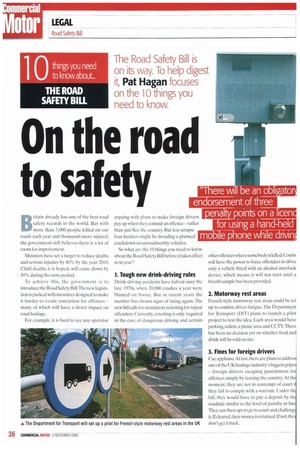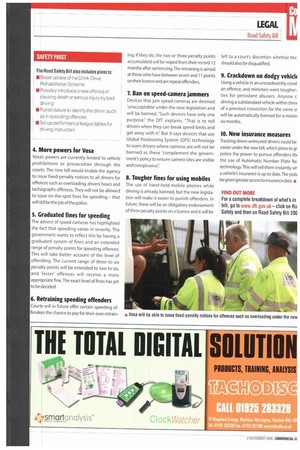On the road to safe
Page 36

Page 37

If you've noticed an error in this article please click here to report it so we can fix it.
Britain already has one of the best road safety records in the world. But with more than 3,000 people killed on our roads each year and thousands more injured, the government still believes there is a lot of room for improvement.
Ministers have set a target to reduce deaths and serious injuries by 4-0% by the year 2010. Child deaths, it is hoped, will come down by 50% during the same period.
To achieve this, the government is to introduce the Road Safety Bill.The new legislation is packed with measures designed to make it harder to evade conviction for offences many of which will have a direct impact on road haulage.
For example, it is hard to see any operator arguing with plans to make foreign drivers pay up when they commit an offence rather than just flee the country. But less scrupulous hauliers might be dreading a planned crackdown on unroadworthy vehicles.
So what are the 10 things you need to know about the Road Safety Bill before it takes effect next year?
1. Tough new drink-driving rules Drink-driving accidents have halved since the late 1970s, when 20,000 crashes a year were blamed on booze. But in recent years the number has shown signs of rising again. The new bill calls for mandatory retesting for repeat offenders. Currently. retesting is only required in the case of dangerous driving and certain other offences where somebody is killed.Courts will have the power to force offenders to drive only a vehicle fitted with an alcohol interlock device, which means it will not start until a breath sample has been provided.
2. Motorway rest areas French-style motorway rest areas could be set up to combat driver fatigue. The Department for Transport ([)IF) plans to launch a pilot project to test the idea. Each area would have parking. toilets. a picnic area and CCTV.There has been no decision yet on whether food an drink will be sold on site.
3. Fines for foreign drivers Cue applause.At last, there are plans to addres. one of the UK haulage industry's biggest gripe foreign drivers escaping punishment fo offences simply by leaving the country. At th• moment, they are not in contempt of court they fail to comply with a warrant. Under th bill, they would have to pay a deposit by th roadside similar to the level of penalty or On They can then opt to go to court and challeng it. if cleared, their money is returned. If not,the don't get it back. 4. More powers for Vosa Vosa's powers are currently limited to vehicle prohibitions or prosecution through the courts. The new bill would enable the agency to issue fixed-penalty notices to all drivers for offences such as overloading, drivers' hours and tachographs offences. They will not be allowed to issue on-the-spot fines for speeding that will still be the job of the police.
5. Graduated fines for speeding The advent of speed cameras has highlighted the fact that speeding varies in severity. The government wants to reflect this by having a graduated system of fines and an extended range of penalty points for speeding offences. This will take better account of the level of offending. The current range of three to six penalty points will be extended to two to six, and 'lesser offences will receive a more appropriate fine. The exact level of fines has yet to be decided.
6. Retraining speeding offenders
Courts will in future offer certain speeding offenders the chance to pay for their own retrain
ing. If they do, the two or three penalty points accumulated will be wiped from their record 12 months after sentencing. The retraining is aimed at those who have between seven and 11 points on their licence and are repeat offenders, 7. Ban on speed-camera jammers
Devices that jam speed cameras are deemed 'unacceptable' under the new legislation and will be banned. Such devices have only one purpose," the DfT explains. "That is to tell drivers when they can break speed limits and get away with it." But it says devices that use Global Positioning System (GPS) technology to warn drivers where cameras are will not be banned as these "complement the government's policy to ensure camera sites are visible and conspicuous':
8. Tougher fines for using mobiles
The use of hand-held mobile phones while driving is already banned, but the new legislation will make it easier to punish offenders. In future, there will be an obligatory endorsement of three penalty points on a licence and it will be left to a court's discretion whether the should also be disqualified.
9. Crackdown on dodgy vehick Using a vehicle in an unroadworthy cond an offence, and ministers want tougher I ties for persistent abusers. Anyone c driving a substandard vehicle within thre( of a previous conviction for the same 01 will be automatically banned for a minim six months.
10. New insurance measures Tracking down uninsured drivers could be easier under the new bill, which plans to gi police the power to pursue offenders thi the use of Automatic Number Plate R& technology.This will tell them instantly wh a vehicle's insurance is up to date. The polic be given greater access to insurance data. •
FIND OUT MORE For a complete breakdown of what's in bill, go to www.dft.gov.ukclick on Ro Safety and then on Road Safety Bill 200




























































































































































































